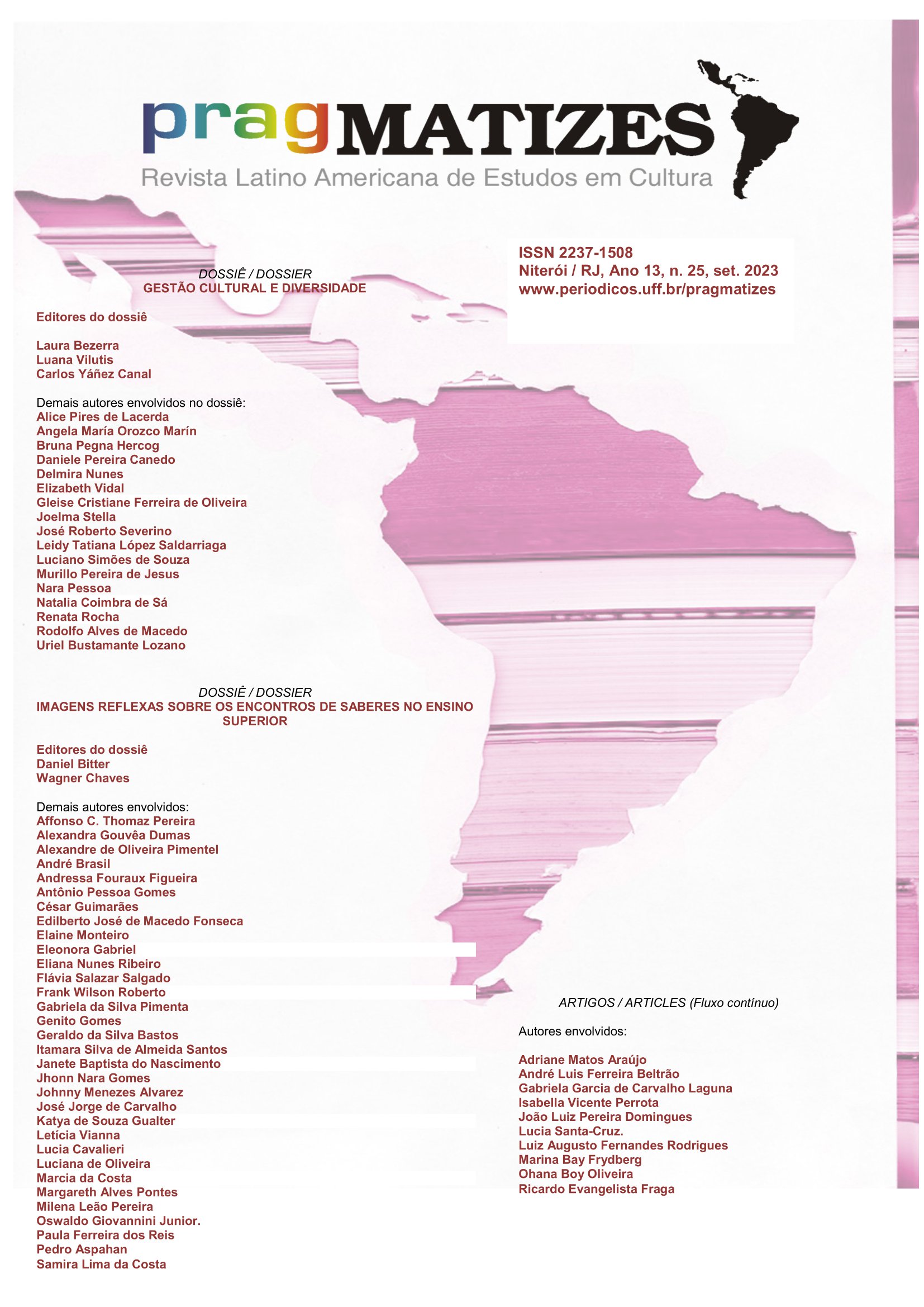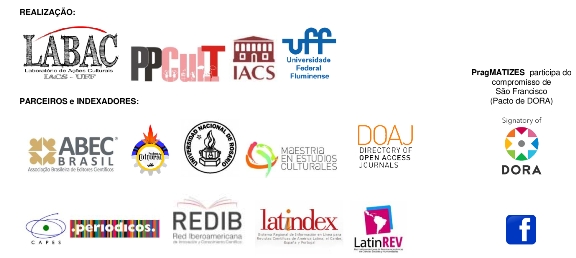Art and communication to produce epistemic dribbles
youth initiatives from the "quebradas" of Salvador (Bahia, Brazil) and Cali (Valle del Cauca, Colombia)
DOI:
https://doi.org/10.22409/pragmatizes.v13i25.57664Keywords:
youth, peripheries, community cultural management, emancipation, epistemologiesAbstract
In this article, I propose to contribute to the reflection on the performance of initiatives in art and communication led by young people in violated territories, starting from the following provocation: with their tactics, artistic productions and models of community cultural management, wouldn't these young people in movement be producing knowledge capable of influencing the processes of emancipation of their territories? What do these cultural management practices that have art and communication as pedagogical foundations, ancestry as a compass, territory as an anchor, and community as a catalyst for action reveal to us? If we understand that through art and communication these young people elaborate epistemic dribbles that invite the composition of other intellectualities, would we not be heading towards the epistemologies of the “quebradas”? In order to advance in these reflections, I dialogue with cultural actions promoted by collectives acting in the peripheries of two Latin American cities: Salvador (Bahia, Brazil) and Cali (Valle del Cauca, Colombia).
Downloads
References
ALBINATI, M. Espacialização das diferentes expressões culturais na cidade. In: KAUARK, G; RATTES, P; LEAL, N (orgs.). Um lugar para os espaços culturais. Salvador: EDUFBA, 2019, p. 135 - 156.
BONFIM, C.; FRANÇA, N; HERCOG, B.; VIEIRA, V. Rumo a uma epistemologia das quebradas: ativismos juvenis para além da resistência. PragMATIZES – Revista Latino-Americana de Estudos em Cultura, Niterói, v. 12, n. 22, p. 245-269, mar. 2022. Disponível em: https://doi.org/10.22409/pragmatizes.v12i22.51098
CERTEAU, M. de. A Invenção do Cotidiano: artes de fazer [vol. 1]. Rio de Janeiro: Vozes, 2014.
CUSICANQUI, S. R. Ch’ixinakax utxiwa: una reflexión sobre prácticas y discursos descolonizadores. Buenos Aires: Tinta Limón, 2010
GOMES, N. L. O Movimento Negro Educador: Saberes construídos nas lutas por emancipação. Petrópolis: Vozes, 2017.
HERCOG, B. Rumo às epistemologias das quebradas: iniciativas juvenis em Salvador (Bahia, Brasil) e Cali (Valle del Cauca, Colômbia). [Tese de Doutorado]. UFBA. Salvador, Bahia, 2022.
KILOMBA, G. Memórias da Plantação: episódios de racismo cotidiano. Rio de Janeiro. Cobogó: 2019.
NASCIMENTO, A. O Quilombismo: documentos de uma militância pan-africanista. Petrópolis, Rio de Janeiro: Vozes, 1980.
NASCIMENTO, É. P. do. É tudo nosso! Produção cultural na periferia paulistana. [Tese de Doutorado]. Universidade de São Paulo, 2011.
NUSSBAUMER; G. M.; KAUARK, G.; Formação e prática em gestão cultural: ente o tecnicismo e o engajamento. Extraprensa, São Paulo, v. 14, n. 2, p. 197 – 210, jan./jun. 2021.
RUFINO, L. Pedagogias das Encruzilhadas. Revista Periferia, v.10, n.1, p. 71 - 88, Jan./Jun. 2018. Disponível em: https://doi.org/10.12957/periferia.2018.31504
SANTOS, M. O retorno do território. In: OSAL: Observatório Social de América Latina. Año 6 no. 16 (jun. 2005). Buenos Aires: CLACSO, 2005. Disponível em: http://bibliotecavirtual.clacso.org.ar/ar/libros/osal/osal16/D16Santos.pdf.
SOUTO, S. Aquilombar-se: insurgências negras na gestão cultural contemporânea. Revista Metamorfose, vol. 4, nº 4, jun de 2020
VILUTIS, L. Gestão cultural comunitária em três dimensões: simbólica, cidadã e econômica. In: RUBIM, A. A. C. (org.). Gestão cultural. Salvador: EDUFBA, 2019
ZIBECHI, R. Autonomías y emancipaciones. América Latina en movimiento. Lima, set. 2007.
Published
How to Cite
Issue
Section
License

This work is licensed under a Creative Commons Attribution 4.0 International License.
By forwarding an original to PragMATIZES, the authors agree that the copyright related to it is transferred to the Publishing. Articles and other writings are made available in PDF format from their publication, and they can be downloaded to institutional repositories and personal pages, provided that with their proper bibliographic indication.



